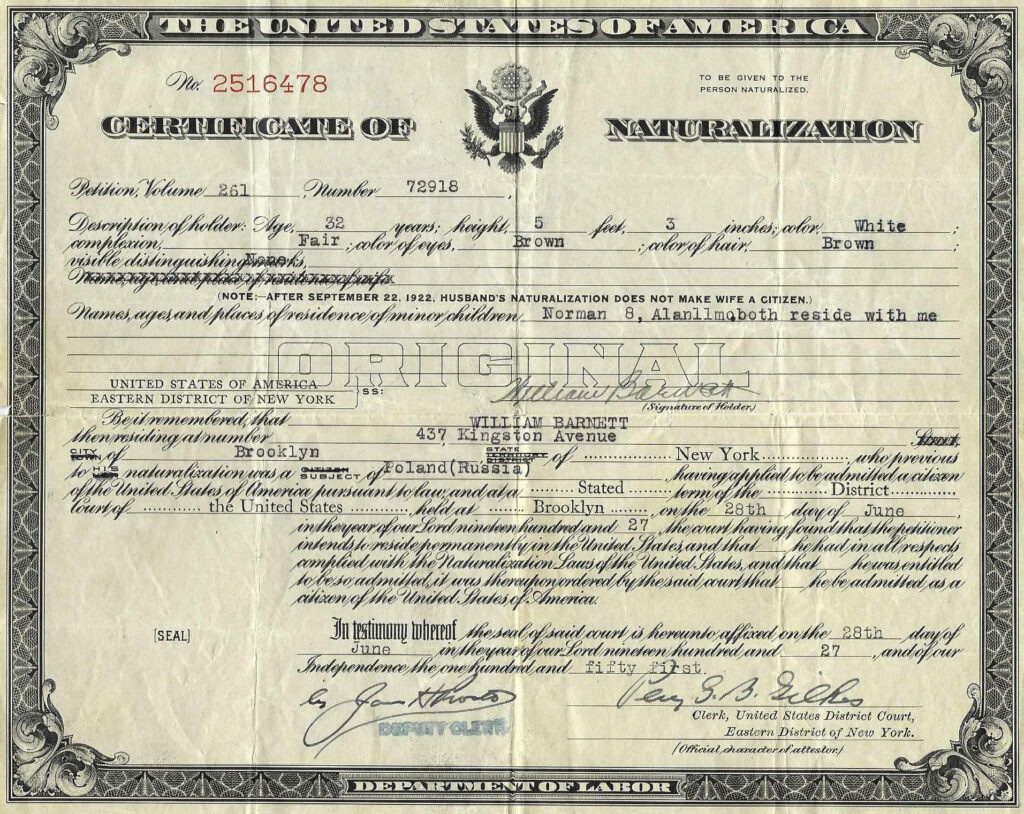
Having moved two months ago from the home my wife and I lived in for nearly 30 years, I’ve been going through boxes, many of which were packed years ago and stored. Among them are boxes of material passed down to me by my father: family photo albums, framed WW2 Army photos, and various documents.
Among the documents I’ve found is the Certificate of Naturalization issued by the District Court of New York in Brooklyn on the 28th of June 1927 to my grandfather, William Barnett.
The certificate states that he “previous to his naturalization was a subject of Poland (Russia)”. Indeed he was. He entered the United States in 1910 as a twelve year old with his eight year old sister in tow. They spent 28 days in steerage, the windowless bottom of a ship where the crankshaft throbs twenty-four hours a day during passage, before they arrived at Ellis Island in New York harbor.
I also found the citizenship paper issued to his wife, my grandmother Hannah, issued on November 11th, 1930, what it notes as the one hundred and fifty-fifth year of independence.
Naturalized citizens have been in the news frequently lately, given the obsession of our current administration and congress. In fits and starts, the story of America is the story of immigration and naturalization. I am the beneficiary of naturalization; America gave a home to countless immigrants from Eastern Europe at the beginning of the 20th Century, my grandparents among them.
When I grew up in New York, the image of the Statue of Liberty was a prominent feature. In school we learned that the great strength of America was its “Melting Pot” character, that America was comprised of immigrants from all over world. It was a good story, and a true one, and has largely remained that way, until now.
People have always had a tendency towards xenophobia; strangers from strange counties – others – are often suspect. Their customs, outfits, habits, language, and appearance are different, and difference makes us nervous. Nonetheless, we were told that immigrants were welcome, and for those of us who are descended from immigrants – everyone of us not Native American – such sentiment was encouraging.
We were told a lot of stories in school about opportunity, democracy, equality under the law, and that America was the land of possibility. As a boy I believed it, although I subsequently learned how difficult life in America has been for many immigrants. The process of “building a more perfect union” is fraught with problems.
Gaining acceptance has always been a challenge for new immigrants, whether Irish, Eastern European, African, Chinese, Haitian, whatever, but at least the law was on their side. Now that reality is being replaced by scenes of masked ICE agents arresting anyone that looks like an immigrant, as if people are guilty until proven innocent.
I can’t help but think of my grandfather, who arrived speaking no English but later succeeded in owning a business he later passed on to my father. He lived the American dream; I have benefitted from it and now my children and grandchildren benefit.
For those of us who are children, grandchildren and descendants of immigrants, basically all of us, this is a sobering time. The rise of xenophobic terror drove my grandfather out of Poland (Russia), and the practice of deporting people to “Alligator Alcatraz” is nothing short of cruel. And that’s America’s choice: cruelty or kindness.